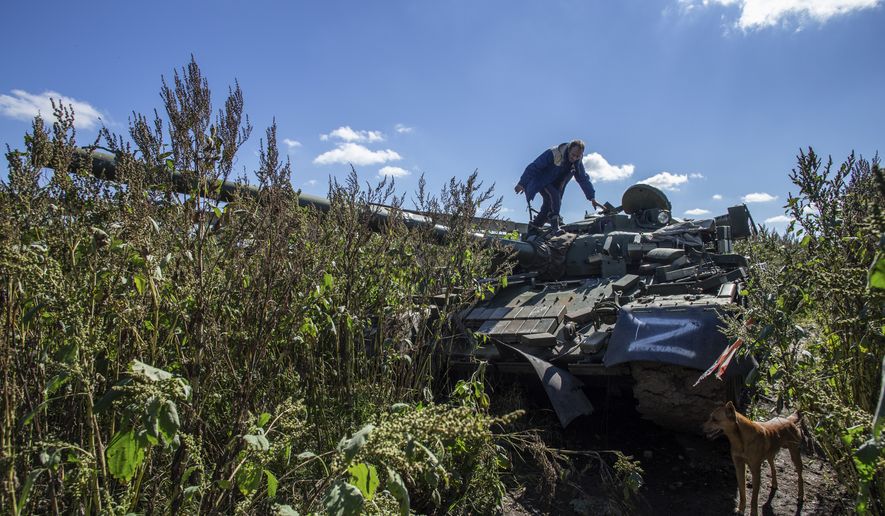President Biden on Wednesday led a parade of Western leaders denouncing Russia for its “outrageous” invasion of Ukraine, arguing that Russian President Vladimir Putin’s threats to escalate a “brutal, needless” war are signs of weakness, not strength, as his troops suffer major losses on the battlefield.
In his address to the U.N. General Assembly on the precipice of a significant escalation in Russia’s ground war, Mr. Biden called on world leaders to unite in rebuking the Kremlin.
“Let us speak plainly: A prominent member of the United Nations Security Council invaded its neighbor and attempted to erase a sovereign state from the map,” he said. “Russia has shamelessly violated the core tenants of the United Nations Charter.
“This world should see these outrageous acts for what they are,” he said. “No one other than Russia sought conflict.”
Hours earlier, Mr. Putin announced in a brief but belligerent national address the mobilization of 300,000 military reservists as the Kremlin attempts to turn the tide after a series of tactical embarrassments in Ukraine. On Tuesday, four Russian-controlled regions in Ukraine announced plans to hold hastily organized plebiscites to formally join the Russian Federation.
The Russian leader said it was unnamed Western allies of Ukraine that were engaged in “nuclear blackmail” by threatening to hit the Russian homeland. He warned darkly that Moscow was ready to respond in kind.
SEE ALSO: All ‘available means’: Putin threatens nuclear escalation, mobilizes Russian reserves
“When the territorial integrity of our country is threatened, to protect Russia and our people, we will certainly use all the means at our disposal,” Mr. Putin said.
The Russian leader found few defenders as world leaders gathered in New York.
British Prime Minister Liz Truss, in her debut speech to the General Assembly, accused Mr. Putin of “desperately trying to justify his catastrophic failures.”
“He is doubling down by sending even more reservists to a terrible fate,” she said. “He is desperately trying to claim the mantle of democracy for a regime without human rights or freedoms. And he is making yet more bogus claims and saber-rattling threats.”
NATO Secretary-General Jens Stoltenberg told reporters in Brussels that Mr. Putin’s rhetoric was “reckless and dangerous” and the alliance was communicating directly to Moscow the readiness of the West to respond to a nuclear attack. He added that NATO officials have seen no change in Russia’s nuclear readiness posture despite Mr. Putin’s threats.
German Chancellor Olaf Scholz, talking to reporters in New York as he attended the U.N. gathering, said the mobilization and the annexation votes represented an “act of desperation” because Mr. Putin knows “he cannot win this criminal war.” European Union foreign ministers held an emergency meeting Wednesday night in New York to discuss even more sanctions on Russia in light of Mr. Putin’s threats.
Even China, whose official press has largely endorsed Mr. Putin’s claim that Russia is fighting a defensive war in Ukraine against Western and NATO encroachment, suggested the Russian leader’s latest words and deeds threaten to make a bad situation worse.
“An emergency brake needs to be put on the situation in Ukraine at a time when the scale of the war is still manageable,” influential commentator Hu Xijin, a former editor of the state-controlled nationalist Global Times, warned in a column.
“There needs to be a cease-fire and negotiations rather than an ever-increasing showdown between Russia and NATO,” Mr. Hu wrote.
“Please don’t forget that there will be no absolute winner or loser in a military conflict between nuclear powers. Whoever tries to completely overwhelm the other side must be crazy.”
In a speech primarily devoted to the crisis in Ukraine, Mr. Biden called the proposed votes in occupied Ukraine a “sham” and warned that Russia was using the referendums as pretexts for annexation.
He said Mr. Putin’s “overt nuclear threats against Europe” are a “reckless disregard” for the responsibilities under the U.N. nonproliferation agreement.
“We, each of us in this body, who are determined to uphold the principles and beliefs, we pledge to defend, as members of the United Nations must be clear, firm and unwavering in our resolve,” he said. “We will stand in solidarity with Ukraine. We will stand in solidarity against Russia’s aggression, period.”
• David R. Sands contributed to this article, which is based in part on wire service reports.
• Joseph Clark can be reached at jclark@washingtontimes.com.




Please read our comment policy before commenting.